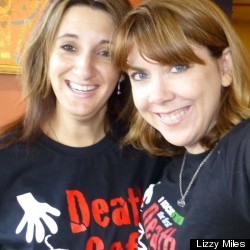
A few dozen Ohioans will meet Wednesday evening in a community room at a Panera Bread outside of Columbus for tea, cake and conversation over an unusual shared curiosity.
For two hours, split between small circles and a larger group discussion, they'll talk about death. A facilitator may throw out questions to spark the conversation: How do they want to die? In their sleep? In the hospital? Of what cause? When do they want die? Is 105 too old? Are they scared? What kind of funerals do they want, if any? Is cremation better than burial? And what do they need accomplish before life is over?
This is the Death Cafe, an anything-goes, frank conversation on death that's been hosted at dozens of coffee shops and community centers in American cities from Arizona to Maine since beginning in the Columbus area in July. Death Cafes are modeled on similar gatherings in European cities that have been taking place for several years.
"The goal is to raise death awareness with the view of helping people make the most of their lives. I'm really passionate about death," said Lizzy Miles, a hospice volunteer and social worker who organizes the Columbus-area cafes, which take place about once a month and draw a range of attendees, from new college graduates to recent retirees.

While the discussion at a Death Cafe is always changing, the format stays generally the same. The organizer, who is usually Miles for the Columbus events, uses donations to purchase tea and cake, and leads an icebreaker by sharing what led him or her to explore death.
"I grew up with a lot of personal loss in my family and have had hospice experiences several times," said Miles, 43. "When my mother died, I had such a positive experience with the hospice volunteer and eventually decided to become a hospice volunteer. And whenever I tell someone what I do, people say two things: 'Oh, it must take a special person,' is the first. But then afterwards, whether I'm at the poker table in Vegas or at the craft store aisle, people are suddenly unloading their stories of death."
Once it gets started, the conversation guides itself. Some people want to talk about creating wills and advance medical directives, such as "do not resuscitate" orders. Others prefer to share near-death experiences and communicating with the dead. And there's often the question of what happens after death -- is there a heaven or hell? Different views on death held by religious traditions also commonly arise.
Death Cafes begin in 2004, when sociologist Bernard Crettaz began hosting pop-up "cafes mortels" in Switzerland. Crettaz, who incorporates the study of death into his research, spread the popular events to Belgium and France. In 2011, the cafes started in the United Kingdom, where Jon Underwood, a former council worker, has hosted nearly two dozen, mostly in London.
Since Miles began North American Death Cafes in Ohio, they've taken place in Albuquerque, N.M.; Ann Arbor, Mich.; Vancouver, B.C.; Sonoma County, Calif., and Chicago. In late February, there will be one in Belfast, Maine. In March, Calgary, Alberta, will host another. Like in Columbus, each cafe is usually led by a hospice worker, social worker, funeral guide or someone otherwise familiar with discussing and dealing with death.
"A lot of people who come are just trying to figure it out," said Miles. "They want to figure out what death -- and life -- should be all about."
